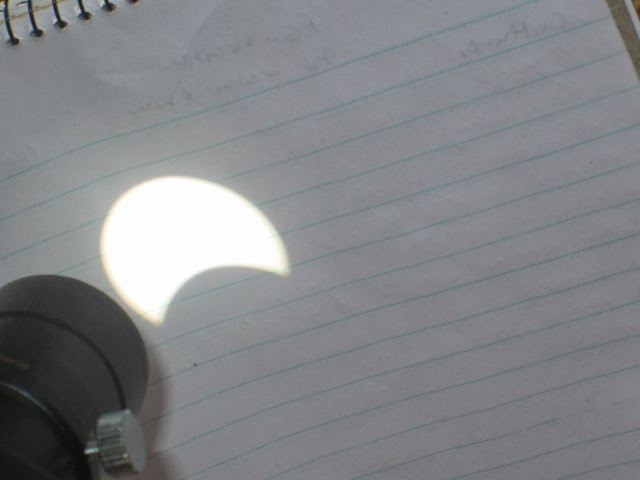It was
an unlikely day for a solar eclipse in Samburu. It rained with no sun in the
sky.
Normally
it’s hot in Samburu with clear, blue skies. This was Murphy’s law- when it’s
supposed to be the solar eclipse, it rains!
Many were doubtful that they would see the eclipse because
of the grey sky.
Despite the odds stacked against us, we offered to take
guests for a sundowner because this eclipse happens once every 40 years.
Using the computerized telescope (ordinary
ones would damage the eyes beyond repair) to locate the sun and reflect it on
paper, we watched the eclipse start at 1620hrs. Twenty-five minutes later, the
moon had covered 60 per cent of the sun. Ten minutes, the clouds covered the
sun.
And we celebrated with a toast to the eclipse.
The rare solar eclipse in Northern Kenya was phenomenal. This solar eclipse was a rare “hybrid” of annular and total eclipses – meaning that the extent to which the moon blocked out the sun depended on where you were in the world.
I had to reflect the sun and the moon through the telescope on a paper.
Local Myths
The Samburu (my tribe) believe that when an eclipse occurs, it is God showing his power to people. He wants to show that he can create darkness during the day. Many of my tribesmen believed that it was the eclipse that had delayed the rains.
1700hrs - the moon had covered the sun this much. Notice the cloudy sky.
Some of the best sightings were in Turkana and Sibiloi in Marsabit where the total eclipse was observed for only 15 seconds. In Samburu Game Reserve we saw 86.3 per cent of the sun covered by the moon.
Sky News
There will be a spectacular shower night on 16th November at approximately 10 p.m.
On 12th and 13th December the stars Leonids and Geminids will appear respectively. It will be full moon and hence a lot of light but serious sky watchers will see 15 to 30 shooting stars at around 2 a.m.
Kids could watch the eclipse through the telescope fitted with a filter to protect the eyes.
Looking at the sun using a telescope will cause irreversible eye damage.
Mr Alex the camp engineer at Samburu Intrepids watching the eclipse using a pair of welding goggles.
Everyone
was excited during the eclipse, and they wanted to capture this event for posterity.
Guests were satisfied with the eclipse and drank
a toast to the eclipse.
Heritage Hotels (Kenya) manages one luxury camp in Samburu National Reserve - Samburu Intrepids Camp. A lush oasis on the banks of the great Uaso Nyiro River, this tented lodge is a delight to be in – deliciously cooled by the river breeze and the forest. Reports and pictures by Steven Tilas, Naturalist, Samburu Intrepids. ©Heritage Hotels Ltd, Kenya. http://www.heritage-eastafrica.com/












Using the computerized telescope (ordinary ones would damage the eyes beyond repair) to locate the sun and reflect it on paper.
ReplyDeleteElgibor Tours